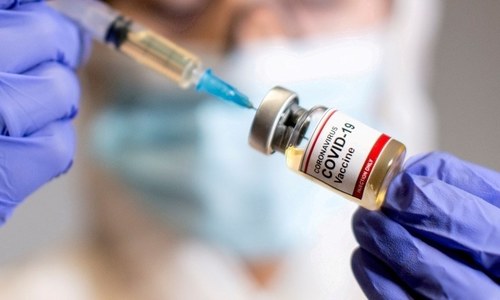The Drug Regulatory Authority of Pakistan (Drap) on Saturday authorised the Oxford University AstraZeneca Covid-19 shot for emergency use in Pakistan, making it the first vaccine to get local approval.
“Drap granted emergency use authorisation to AstraZeneca’s Covid vaccine,” Special Assistant to the Prime Minister on Health Dr Faisal Sultan told Reuters.
AstraZeneca said in November its vaccine could be as much as 90 per cent effective. The shot was approved and has already been deployed in several other countries including the United Kingdom and India.
Researchers said a regimen of a half dose followed by a full dose booster appeared to be 90 per cent effective in preventing Covid-19 whereas two full doses scored 62pc. No serious safety events were confirmed, the company said.
Pakistan has also pre-booked more than a million doses of Sinopharm's vaccine from China, Sultan said, adding that the Sinopharm vaccine is awaiting approval from Drap, which has received and reviewed its data. Its efficacy rate was announced at 79.3pc by Chinese health authorities.
Read: Sindh urges Centre to allow provinces to procure Covid-19 vaccines
“We are in the process to obtain Western origin and other vaccines both via bilateral purchase agreements as well as via the Covax facility,” Sultan said.
He added the country could get “in the range of tens of millions” of vaccine doses under an agreement with China's CanSinoBio.
The vaccine company's Ad5-nCoV Covid-19 candidate is nearing completion of Phase III clinical trials in Pakistan.
Efficacy is a key factor, said Sultan. “We have and are watching the evolving stories around efficacy of a number of vaccines.” He said preliminary results of the Cansino vaccine may come in by mid-February, adding that Pakistan was also considering to engage with Russia's Sputnik V vaccine.
Pakistan reported 2,432 new coronavirus infections and 45 deaths on Friday, taking the total number of cases to more than 516,000 and deaths close to 11,000.
“Our aim is that the bulk of the population will be covered free,” the PM's aide said, adding that private sectors could also be allowed once supply was available to an authorised company.
Sultan added that Pakistan had adequate cold chain facilities for most kinds of vaccines.
A day earlier, he told Dawn it was a matter of days before orders to purchase a vaccine would be placed, and negated the impression that the government had delayed the procurement process.
The special assistant had said although the country had a population of 200 million, 100 million were under the age of 18, and therefore would not be vaccinated. “As 100pc population cannot be vaccinated in any country, we need to target 70pc of the vaccineable population, which is 70 million.”
Low cost
The AstraZeneca vaccine has some advantages over offerings from US rivals, though its efficacy results lag slightly behind.
The drug’s cost to governments works out at just a few dollars a shot, a fraction of the price of shots from Pfizer and Moderna, which use a more unconventional technology.
It can also be transported and stored at normal fridge temperatures, which proponents say would make it easier to distribute, especially in poor countries, than Pfizer’s, which needs to be shipped and stored at -70 degrees celsius.
The faster rollout means both rich and poor countries that had been drawing up plans to ration vaccines can distribute them more widely.
Controversy
But the AstraZeneca shot did raise eyebrows when it published its results and Oxford researchers said they weren’t certain why the half-dose regimen was much more effective.
Some experts say the dosing discrepancy raises doubts about the robustness of the study’s findings. And they worry about another acknowledged peculiarity of the study: The half-dose regimen wasn’t tested on anyone over 55 – the group considered at high risk from Covid-19.
A Reuters special report published in December after reviewing hundreds of pages of clinical trial records, as well as interviews with scientists and industry figures, said the discrepancy arose due to a "potency miscalculation" by Oxford researchers, according to their own clinical trial documents.
In a statement to Reuters, Oxford University had said all trials were “conducted under the strict national, ethical and regulatory requirements.” It added that “all trial protocols and trial amendments have been subject to review and approval by the relevant authorities. All safety data have been reviewed regularly” by regulators.













































